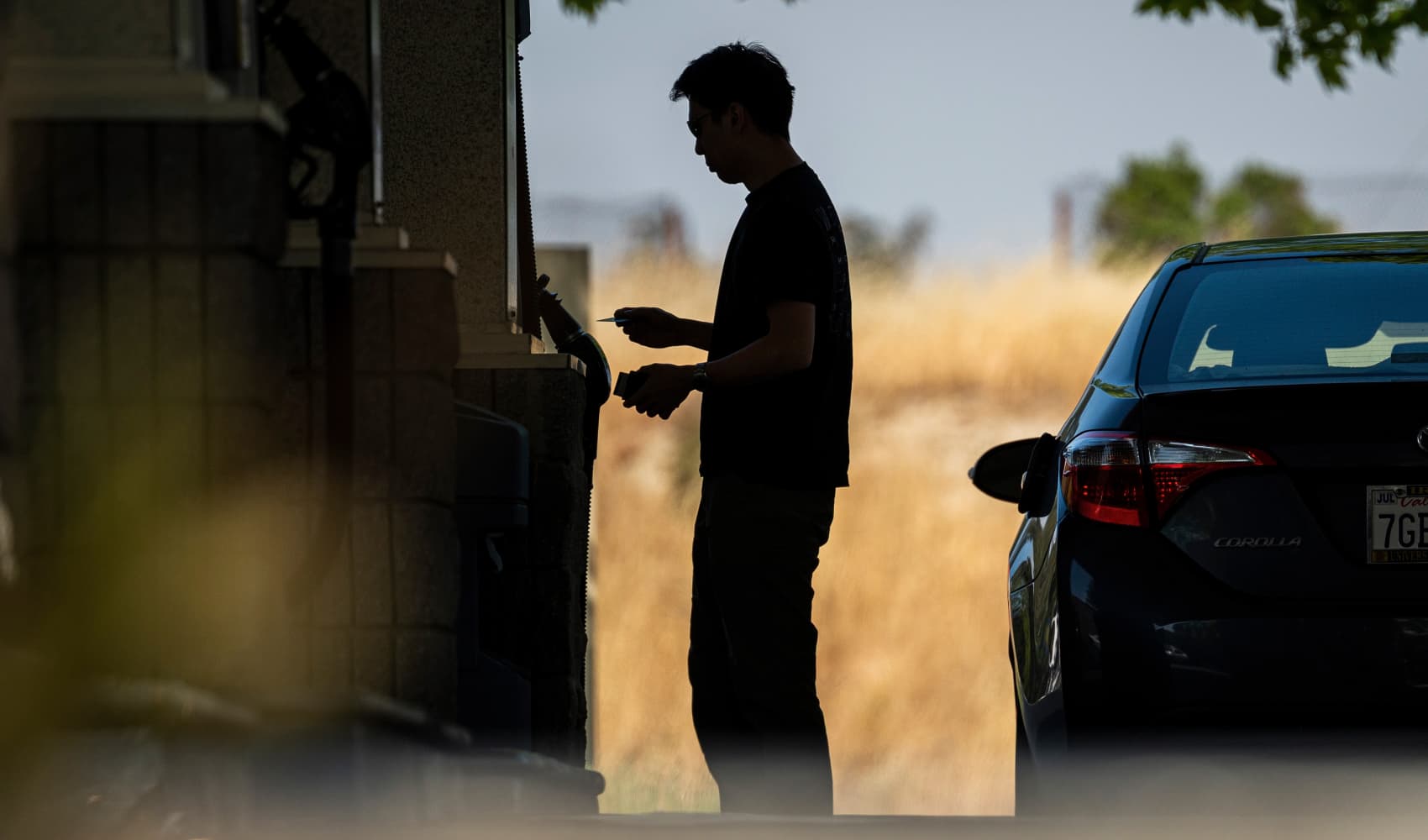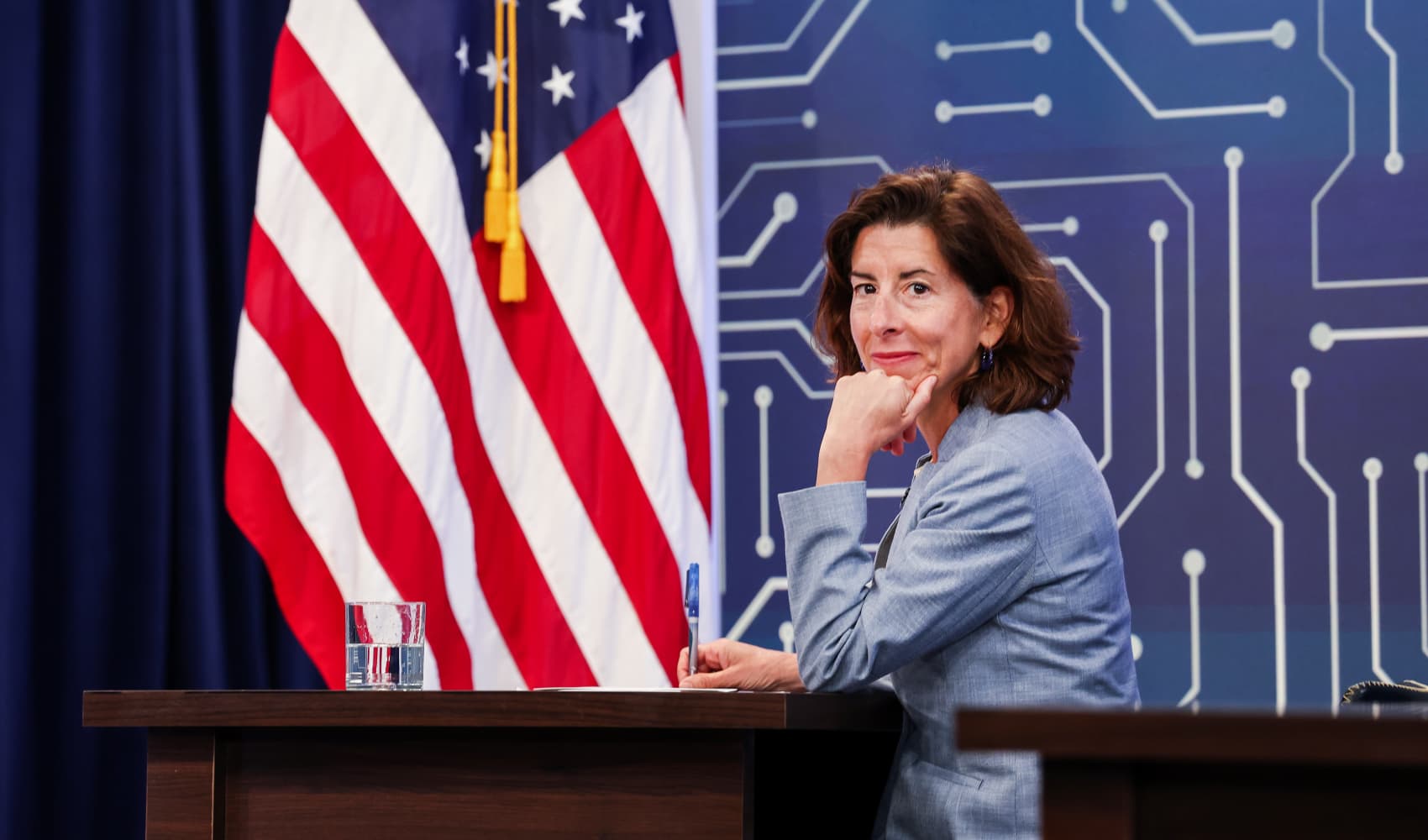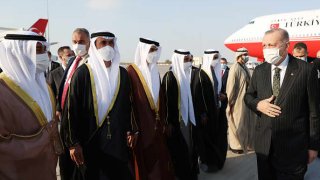
- For years, Turkey and the UAE have been on opposing sides of regional conflicts due to deeply conflicting ideologies.
- Erdogan and the UAE's de-facto leader Crown Prince Mohammed bin Zayed al Nahyan on Monday signed 12 agreements across the defense, commercial and cultural sectors, along with significant investment pledges from the UAE.
- Just over a year prior, Dubai-Istanbul flights were suspended for months at a time and Turkish state news websites were inaccessible from the UAE without a VPN.
DUBAI, United Arab Emirates — Turkish President Recep Tayyip Erdogan arrived in the United Arab Emirates to a warm welcome this week, praising renewed ties between the two regional powers after years of proxy competition, unofficial boycotts and acrimonious accusations.
Erdogan and the UAE's de-facto leader Crown Prince Mohammed bin Zayed al Nahyan, formerly adversaries, signed some 13 agreements in defense, trade, technology, agriculture and other sectors, along with significant investment pledges from the UAE. Dubai's iconic Burj Khalifa, the world's tallest building, was lit up with the colors of the Turkish flag and the words "Hos Geldiniz," Turkish for "welcome."
Just over a year prior, Dubai-Istanbul flights were suspended for months at a time and Turkish state news websites were inaccessible from the UAE without a VPN.
Get Connecticut local news, weather forecasts and entertainment stories to your inbox. Sign up for NBC Connecticut newsletters.
"During this visit, we aim to develop the momentum we have harnessed with the United Arab Emirates and to take all necessary steps for relations to revert to the level they merit," Erdogan told local media on Monday, before a visit to Dubai Expo on Tuesday. "Dialogue and cooperation between Turkey and the United Arab Emirates carries great significance for peace and stability in our entire region."
Former UAE foreign minister and presidential advisor Anwar Gargash tweeted, "President Recep Tayyip Erdogan's visit to the UAE … opens a new positive page in the bilateral relations between the two countries."
Money Report
Less than two years prior, in a 2020 interview, Gargash was calling for Europe to join forces against what he said was Erdogan's attempt "to revive the Ottoman Empire."
Years of acrimony
The decision to make up is a big deal.
For years, Turkey and the UAE have been on opposing sides of regional conflicts due to deeply conflicting ideologies. In the years since the Arab Spring, Erdogan and his pro-Muslim Brotherhood AK Party supported political Islam movements in numerous countries, something that's seen as a threat to Gulf monarchies like the UAE.
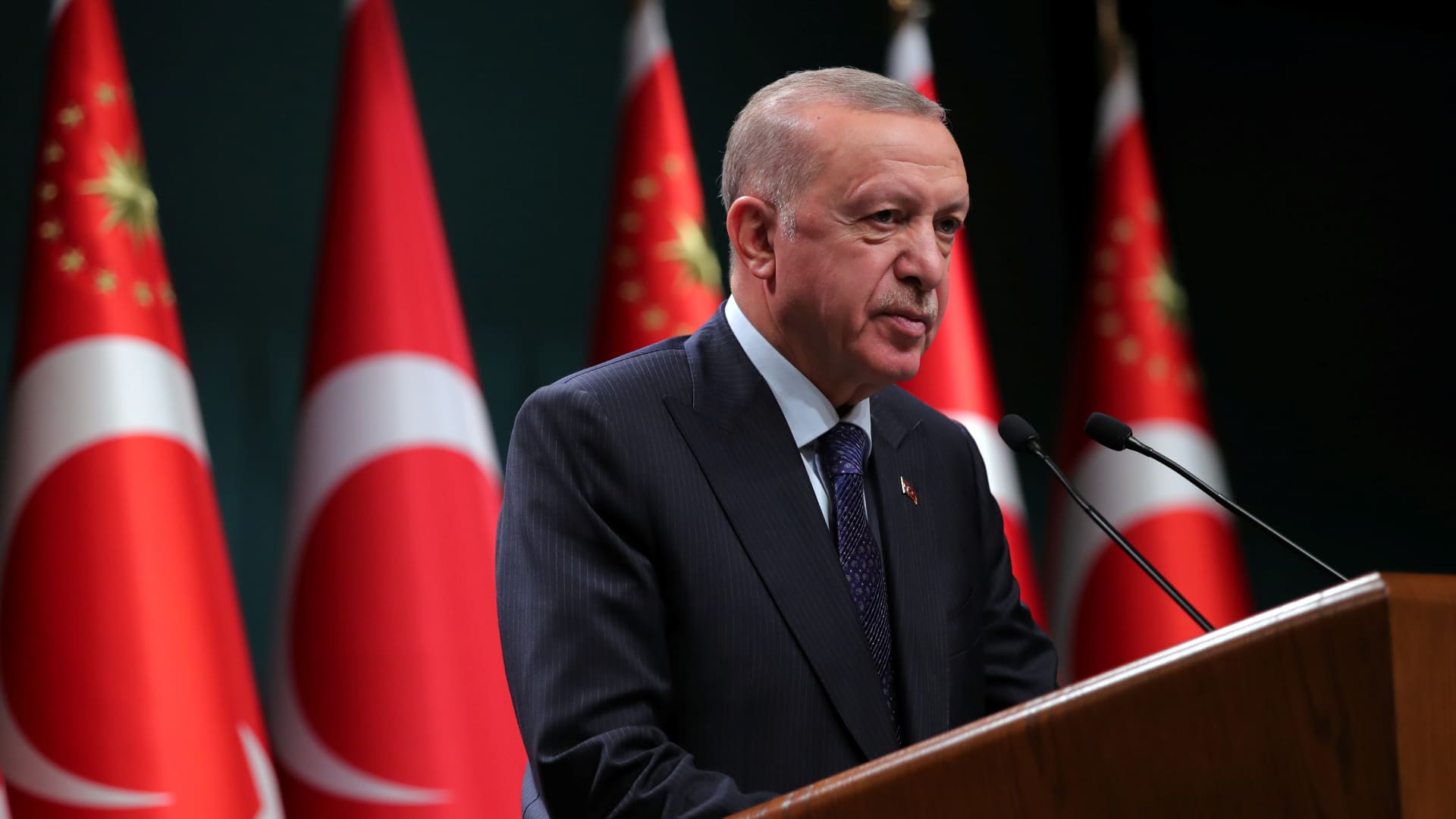
In their competition for regional influence, Ankara and Abu Dhabi backed opposite sides of the bloody Libyan civil war, which has now turned into a stalemate. Turkey vociferously opposed the blockade that the UAE and other Gulf states imposed on Qatar from 2017 to 2021, and Erdogan had previously accused the UAE of bankrolling Turkey's 2016 attempted military coup.
'Less threatening than before'
A number of key factors have led to the recent change.
"The biggest single factor is the collapse of the Muslim Brotherhood project in the Arab world, which was the main basis for Turkish-UAE tensions over the past decade," said Hussein Ibish, a senior resident scholar at the Arab Gulf States Institute in Washington.
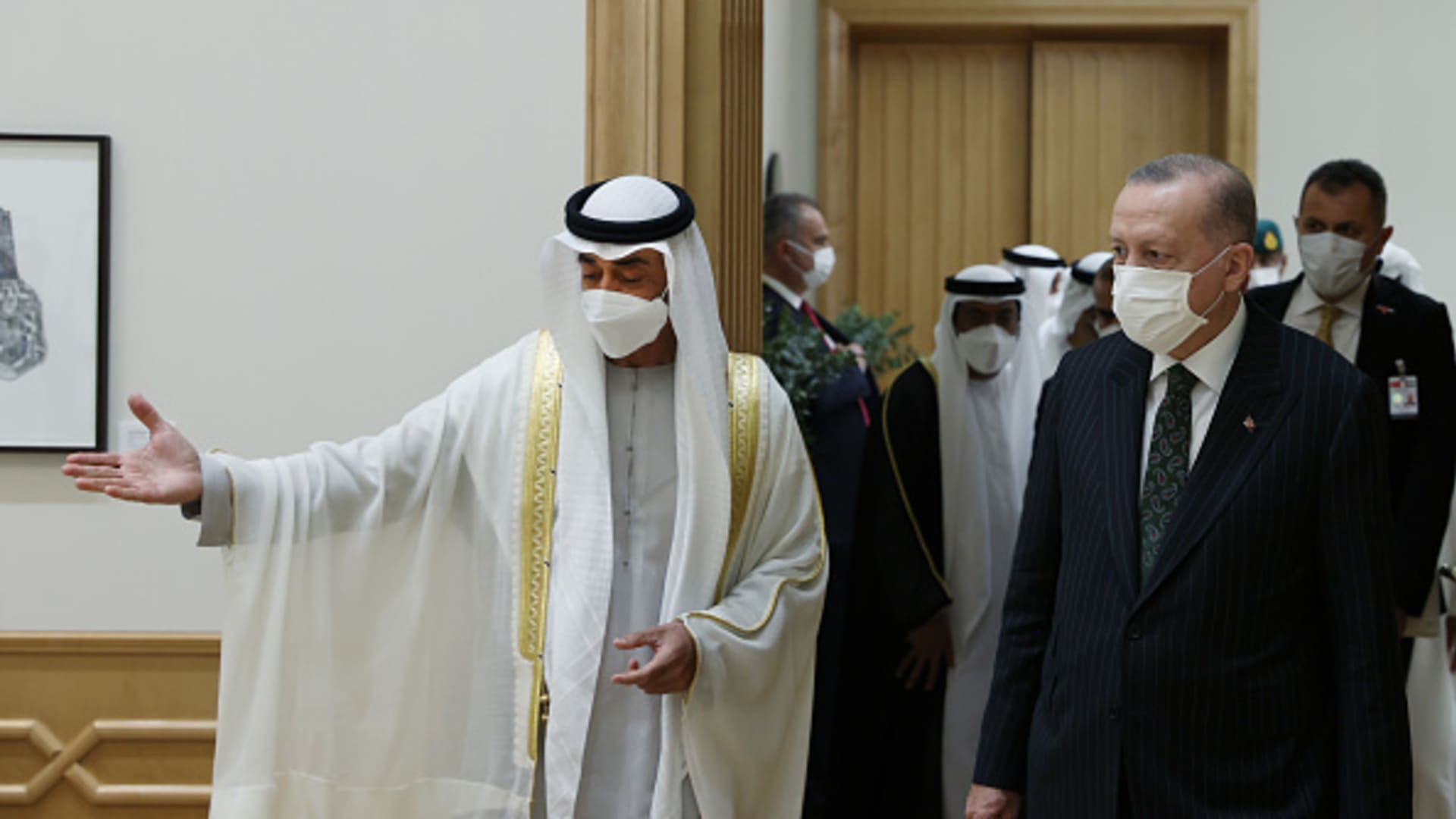
Indeed, the Muslim Brotherhood's political power, which only really remained in Tunisia, Libya, Gaza and parts of Yemen, has been dramatically depleted in the last year with a coup and open-ended constitutional suspension in Tunisia and political stalemate in Libya.
Turkey was viewed in the UAE "as a leader, in cooperation with Qatar, of a potential network of Sunni Islamists throughout the region that could rival or even outdo Iran's network of Shiite armed gangs in neighboring Arab countries," Ibish said. "But that didn't emerge. Instead, the Brotherhood has pretty much collapsed as a viable political project, so Turkey appears much less threatening than before."
U.S. President Joe Biden's administration, which has signaled it's no longer giving carte blanche to its Gulf allies, is likely another factor. But more obvious are economic needs and an apparent pullback by both countries from regional conflicts in favor of diplomacy and business links.
"I think for both sides we're seeing the reemergence of pragmatism after years of confrontationalism and adventurism in the Trump era," said Ryan Bohl, a Middle East and Africa analyst at Rane Risk Intelligence. "That's in part because there's a new [U.S.] presidential administration, but I think most of it is driven by their own shifting imperatives caused by the pandemic."
Money talks
Turkey's economy is in crisis, with inflation at a whopping 48.7% and its national currency, the lira, having lost roughly 48% of its value in the last year. Meanwhile, the UAE has been pushing to further diversify its economy away from oil and revive itself from the economic blow of Covid-19.
"The UAE is looking to invest money. Turkey needs money invested. It's a natural fit," Ibish said. And the timing means the Emiratis are getting a bargain, thanks to the cheapness of the lira.
Abu Dhabi state investment vehicle ADQ in January pledged $10 billion in investments into Turkey, saying that now was a "great time" to buy with the dramatically weakened currency and that it was taking a "long term view." And during a visit by Mohammed bin Zayed to Ankara in November, the first in many years, ADQ and Turkish investment bodies and companies signed memorandums of understanding worth billions of dollars in sectors including energy, technology and logistics.
"For the UAE, Turkey becomes a major new conduit to new markets in Asia, and especially Africa," Ibish said. "Turkey also provides an entrée into certain commercial fields and Turkish real estate is potentially a bonanza, if all goes well."
Iran and Israel
Turkey is also seeking to mend ties with Israel, officially a friend of the UAE since the announcement of the Abraham Accords in August of 2020. Israeli President Isaac Herzog is scheduled for an official visit to Turkey in March, despite the fact that Turkey in 2020 threatened to cut ties with the UAE over its normalization deal with Israel.
The rapprochement comes amid heightened tensions in the region as Iran's nuclear development progresses, and in the wake of a series of drone and missile attacks on the UAE mostly claimed by Yemen's Houthi rebels, who are backed by Iran.
"The new U.S. administration and western countries' policy vis-à-vis Iran, and Turkey's new diplomatic approach to Israel … are some of the reasons behind this new page" in relations, one former Turkish diplomat with experience in the Gulf told CNBC, speaking anonymously due to professional constraints.
"For the Turkish side, the increase of economic and commercial relations will be very important. On the UAE side, [having] Turkey as a trusted ally vis-à-vis Iran will be the benefit," the diplomat said.
Still, the coalescence of mutual interests doesn't mean the ideological differences between the two countries have been resolved.
"At the moment what it looks like is both sides are licking their wounds and making nice because the costs of confrontationalism became increasingly too high for them," Rane's Bohl said. "But that doesn't mean that they've come to any substantial agreements and so conflict and competition could return again one day."
In the meantime, it's time for all the countries that are "overextended" from regional sparring "to take a break from confrontation," Ibish said, "meaning diplomacy, politics and commerce as a means of securing their interests and projecting their influence."


